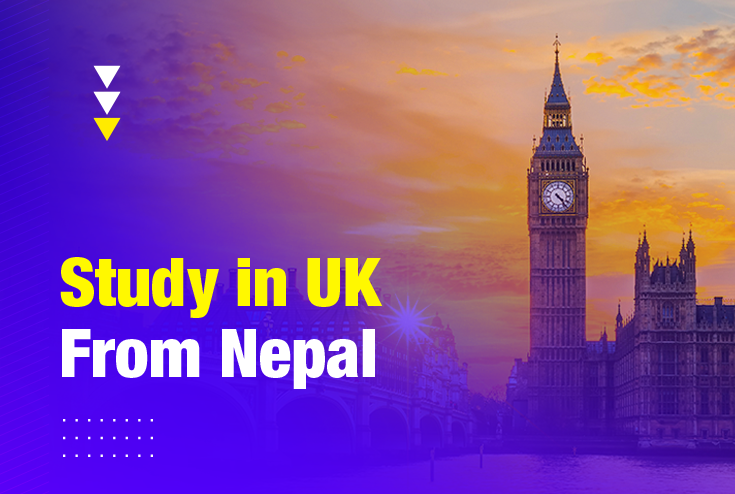
Study in UK from Nepal: A Guide 2025
Studying abroad is a dream for many Nepalese students, and the UK stands out as one of the best destinations for higher education. With world-class universities, diverse cultural exposure, and sample career opportunities, the UK offers an enriching academic experience. But what does it take to study in the UK from Nepal? This guide covers everything you need to know, from requirements and costs to scholarships and visa success rates.
Table of contents
- Introduction
- Why Study in the UK?
- Study in UK from Nepal Requirements
- Academic Requirements
- English Language Proficiency
- Financial Requirements
- Document Checklist for UK Student Visa
- Total Cost to Study in UK from Nepal
- Tuition Fees
- Living Expenses
- Additional Costs
- Study in UK from Nepal Consultancy
- Visa Success Rate for UK from Nepal
- Common Reasons for Visa Rejection
- Student Visa Success Rate for UK from Nepal
- Scholarship in UK for Nepali Students
- How to Apply for UK Scholarships
- MBBS in UK for Nepali Students
- Best Medical Schools in the UK
- PR in UK for Nepali Students
- Pathways to Permanent Residency
- Top Universities in the UK for Nepalese Students
- Part-Time Work Opportunities for Nepalese Students
- Best Cities for Part-Time Jobs
- Post-Study Work Opportunities in the UK
- Tips for a Successful UK Study Experience
- Conclusion and FAQs
Why Study in the UK?
The UK is home to some of the world's most prestigious universities, offering globally recognized degrees that significantly enhance career prospects. Its high-quality education system ensures rigorous academic standards, making UK graduates highly sought after worldwide. Students have access to diverse course options, whether in science, business, humanities, or medicine, ensuring they find a program suited to their ambitions. The UK's reputation for research excellence also attracts aspiring scholars, providing opportunities to work alongside leading experts. Additionally, the multicultural environment fosters global networking, and with post-study work options available, students can gain valuable international work experience.
Study in UK from Nepal Requirements
Academic Requirements
To study in the UK, Nepalese students must meet specific academic qualifications. They must have completed 12 years of education (A-Levels, IB, or equivalent) to qualify for undergraduate programs, while postgraduate courses require a recognized undergraduate degree. Universities also consider academic performance, requiring a minimum GPA depending on the program. Certain competitive fields, such as medicine and engineering, may have additional entrance exams or interviews.
English Language Proficiency
As English is the primary language of instruction, students must prove their proficiency through recognized tests. Most universities require IELTS (6.0-7.0), TOEFL (80-100), or PTE (58-65) scores. However, some universities may waive this requirement for students who completed their education in English-medium institutions.
Financial Requirements
Applicants must demonstrate sufficient financial resources to cover tuition and living expenses. UKVI (UK Visas and Immigration) requires proof of funding for at least one academic year, ensuring students can sustain themselves financially while studying.
Document Checklist for UK Student Visa
A complete application requires:
- A valid passport
- Confirmation of Acceptance for Studies (CAS) from a UK university
- Proof of financial stability
- English language test results
- Tuberculosis test certificate (if required)
Total Cost to Study in UK from Nepal
Tuition Fees
The cost of studying varies by university and program. On average:
- Undergraduate courses cost £10,000-£20,000 per year
- Postgraduate programs range from £12,000-£25,000 per year
- MBBS programs cost between £30,000-£50,000 per year
Living Expenses
Living costs vary by location:
- London: £12,000-£15,000 per year
- Other cities: £8,000-£10,000 per year
Additional Costs
Students should also budget for visa application fees (£400), health insurance (£624 per year), and other personal expenses.
Study in UK from Nepal Consultancy
Many consultancies in Nepal assist students in selecting universities, preparing applications, and handling visa processes. Some reputable consultancies include AECC Global Nepal, Edwise Foundation, and Kangaroo Education Foundation.
Visa Success Rate for UK from Nepal
The UK student visa success rate for Nepalese students is 85-90%, provided they meet financial and academic requirements.
Common Reasons for Visa Rejection
- Insufficient financial proof
- Low English proficiency scores
- Incomplete or incorrect documentation
Scholarship in UK for Nepali Students
Scholarships ease financial burdens, with popular options including:
- Chevening Scholarships
- Commonwealth Scholarships
- GREAT Scholarships
MBBS in UK for Nepali Students
Top medical schools include:
- University of Oxford
- University of Cambridge
- Imperial College London
PR in UK for Nepali Students
Students can apply for Indefinite Leave to Remain (ILR) after five years of work experience under a skilled visa.
Part-Time Work Opportunities for Nepalese Students
Students can work up to 20 hours per week during term time and full-time during holidays. Popular job sectors include retail, hospitality, and administrative support.
Conclusion
Studying in the UK offers Nepalese students access to high-quality education, global exposure, and career prospects. Planning finances, securing scholarships, and understanding visa requirements are crucial for a smooth transition.
FAQs
What is the total cost to study in the UK from Nepal?
It ranges from £20,000 to £50,000 per year, covering tuition and living expenses.
What are the visa requirements for Nepalese students?
Students need an offer letter, financial proof, and English proficiency test results.
Can I work while studying in the UK?
Yes, students can work up to 20 hours per week during term time and full-time during holidays.
Is there a PR pathway for Nepalese students in the UK?
Yes, after five years of work under a skilled visa, students can apply for PR.
Are there scholarships for Nepalese students in the UK?
Yes, several scholarships like Chevening and Commonwealth Scholarships are available.




